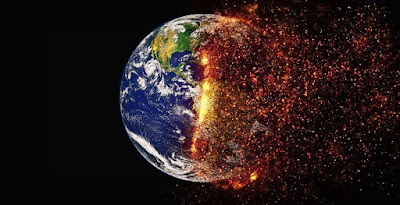International moves on climate change
The United Nations Framework Convention on Climate Change was adopted in 1992 and entered into force in 1994 and was ratified by 196 parties, including the European Union. Without any serious human impact on the climate system,
it became the first practical and binding application of the Convention officially through the Kyoto Protocol, which was adopted in 1997 and entered into force in 2005, ratified by 192 parties without the United States, and the protocol was imposed on 37 developed countries A general reduction of emissions by 5% compared to 1990 and an average reduction of 8% for the European Union in the period from 2008 to 2012.
As for the rest of the countries, they did not commit to a specific rate, but were involved in the process of combating climate change through incentive mechanisms.
This was followed by a number of conferences, agreements and protocols through which a number of countries withdrew.
until the conclusion of a global agreement in Paris on climate change in December 2015, and 197 countries adopted the Paris Agreement at the twenty-first Conference of the Parties on 12 December 2015 The agreement includes commitments from all countries to reduce their emissions and work together to adapt to the effects of climate change and calls on countries to strengthen their commitments over time, as 189 countries joined the Paris Agreement, which provided a path for developed countries to assist developing countries in mitigation efforts Climate severity and adaptation with the establishment of a framework for transparent monitoring and reporting on climate goals for countries.
The agreement also provides a permanent framework that guides the global effort for decades to come. The goal is to raise the level of countries’ climate ambition over time. over the course of five years.
The Paris Agreement officially entered into force on November 4, 2016. To date, 195 parties have signed and 189 parties have ratified the agreement. In 2018, delegates to COP24 in Poland adopted comprehensive rules detailing the operational details of the Paris Agreement:
Limit the temperature rise to 1.5 degrees Celsius.
Review the countries' commitments to reduce emissions every five years.
Providing climate finance for developing countries.read more
A report issued by the United Nations Framework Convention on Climate Change (UNFCCC) indicated that most of the countries represented (in the report) raised the ceiling of their individual ambitions to reduce greenhouse gas emissions, but the combined effect puts them on the path of reducing emissions by (1%) only with By 2030 compared to 2010 levels.
United Nations Secretary-General Antonio Guterres warned that this report is “a warning to our planet and shows that governments are not close to the level of ambition required to limit climate change to (1.5 degrees Celsius) and achieve the goals of the Paris Agreement in 2015 Guterres added that 2021 is a critical year to address the climate emergency, saying, "The science is clear, to limit global temperature rise to (1.5 degrees Celsius) global emissions must fall by 45 percent by 2030 from 2010 levels."
For his part, COP 26 President Alok Sharma warned of the consequences of climate change and urged major countries to reduce their emissions of greenhouse gases that cause global warming. “This report should be an urgent call to action and I am asking all countries, especially countries emitters to present ambitious targets for reducing emissions by 2030.”
Sharma also warned of the loss of time and the delay in the event that the threat of climate change is not addressed, saying, “We must realize that the solution period to protect the planet is rapidly narrowing.”
Therefore, it is necessary to move forward and urge all countries of the world, especially developed countries, to reduce their emissions of greenhouse gases in order to limit climate change and its negative and dangerous effects on human rights and its cause of past, present and future conflicts and conflicts.


Comments
Post a Comment
Thank you for comment